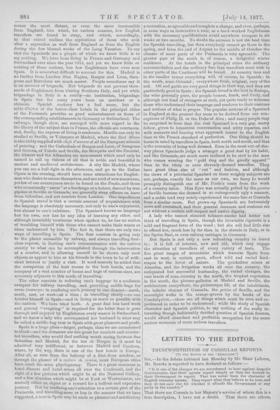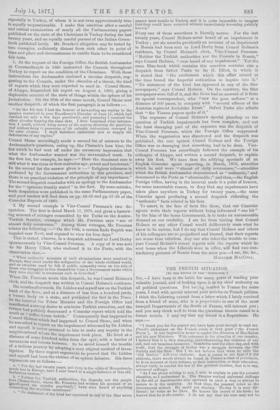LETTERS TO THE EDITOR.
TRUSTWORTHINESS OF CONSULAR REPORTS.
[TO 'THE. EDITOR Or THE SPECTATOR,"]
SIR,—In the debate initiated last Monday by Mr. Shaw Lefevre, Mr. Bourke is reported to have declared as follows It is one of the charges we are accustomed to hoar against despotic Governments, that their agents report simply as they are desired by their Government to report. That has never been the character of English consular agents. They report what they believe to be true, and they do not care one bit whether it offends the Government or any
party in the country." •
That there are Consuls in Tier Majesty's service of whom this is a true description, I have not a doubt. That there are others,
especially in Turkey, of whom it is not even approximately true IS equally unquestionable. 1 make this assertion after a careful and critical examination of nearly all the Parliamentary papers published on the state of the Christians in Turkey during the last twenty years, and an equally careful perusal of the Italian Green- book published lately. Mr. Bourke's allegation may be tested by two examples, sufficiently distant from each other in point of time and place and circumstances to entitle them to be considered fair tests.
1. At the request of the Foreign Office, the British Ambassador at Constantinople in 1860 instructed the Consuls throughout Turkey to report on the condition of the Christians. With these instructions the Ambassador enclosed a circular despatch, sug- gesting to the Consuls, under the stimulus of a threat, the kind of reports which they were expected to send in. Consul Skene, of Aleppo, despatched his report on August 4, 1860, giving a deplorable account of the state of things within the sphere of his jurisdiction. On the 20th of the same month, Consul Skene sent another despatch, of which the first paragraph is as follows :—
" On the 4th inst. I bad the honour of forwarding my replies to the queries contained in your Excellency's Circular of Juno 11, which had reached me only a few days previously, and yesterday I received the other circular bearing the same date. I than furnished what informa- tion I could, without being aware of the motives dictating the questions, and without being in possession of the valuable instructions conveyed by Site other circular. I shall therefore endeavour now to supply the deficiencies of my replies."
-Consul Skene accordingly sends a second list of answers to the Ambassador's questions, eating up, like Pharaoh's lean kine, the list which he had sent off under the erroneous impression that -what the Ambassador wanted was the unvarnished truth. In the first list, for example, he says :—" Here the dominant race is still what it was three or four centuries ago, proud and intolerant." in the second list the answer given is :—" Religious tolerance is professed by the Government authorities in this province, and there is no practical violation of the principle of any importance." The second despatch concludes with an apology to the Ambassador for the " opinions frankly stated " in the first. By some mistake, both despatches were published in the same Parliamentary paper, and your readers will find them on pp. 48-53 and pp. 67-69 of the Consular Reports of 1860.
2. My second example is Vice-Consul Freeman's two de- spatches. The first is dated March 17, 1876, and gives a harrow- ing account of outrages committed by the Turks on the Austro- Turkish frontier, outrages which Mr. Freeman says "are of almost daily occurrence." Among these outrages, Mr. Freeman relates the following :—" On the 10th, a certain Rado Buyioh was impaled near Novi, and exposed to view for four days." This is stated, observe, in a despatch addressed to Lord Derby spontaneously by Vice-Consul Freeman. A copy of it was sent to Sir Henry Elliot, who enclosed it to the Porto, with the observation that,—
"When authentic accounts of snob abominations were received in Europe, they must excite the indignation of the whole civilised world, .and no surprise need be felt if public sympathy were on the side of those who struggled to free themselves from a Government under which
they wore exposed to treatment such as described." .
When Mr. Freeman wrote this despatch, he was Consul Holmes's clerk, and the despatch was written in Consul Holmes's residence.
Six months afterwards, Dr. Liddon and myself saw on the Turkish bank of the Save, and at a distance of less than a hundred yards, a human body on a stake, and published the fact in the Times. In the interval the Prime Minister and the Foreign Office had mforifested a strong desire to minimise Turkish atrocities, and the truinth" had Publicly denounced a Consular report which told the
" coffee-house babble." Consequently that happened to 'Consul Holmes which had happened to Consul Skene, and when of a tedious journey by adopting a very original method of inves- tigation. By three cogent arguments he proved that Dr. Liddon and myself bad been the victims of an optical delusion. His three Arguments are as follows :—
cre1 . 1 "For. the last twenty years. not oven in the wilds of Mesopotamia, mu s in Europe, have I ever heard of a single instance of this old,
barbarous custom."
‘, Neither the Turkish authorities, the Consuls, nor the people here [Bosna-Seral, where Mr. Freeman bad written his account of an iinpalement six months previously] have over hoard of anything resembling the cruelties mentioned." C. " Ne statement of the kind has appeared in any of the Slav news- 'he was asked to report on the impalement witnessed by Dr. Liddon -and myself, it never occurred to him to make any inquiry in the neighbourhood where t be impalement took place. He lived at a distance of some hundred miles from the spot, with a barrier of mountains and forests between. So he saved himself the trouble
papers most hostile to Turkey, and it is quite impossible to imagine that they could have occurred without immediately becoming publicly known."
Every one of those assertions is literally untrue. For the last twenty years, Consul IIolmes never heard of an impalement in Turkey ; yet six months previously an account of an impalement in Bosnia had bees sent to Lord Derby from Consul Ilolmes's residence, by Consul Holmes's clerk, Vice-Consul Freeman. "Neither the Turkish authorities nor the Consuls in Bosnia," says Consul Holmes, "ever beard of any impalement." Yet the same Blue-book which contains this assertion contains also a despatch from Safvet Pasha to Sir 11. Elliot, in which it is stated that "time excitement which this affair caused at the time forced the Imperial authorities to inquire into it." "No statement of the kind has appeared in any of the Slav newspapers," says Consul Holmes. On the contrary, the Slav newspapers were full of it, and the Golos had an account of it from its special correspondent, who "saw the poor sufferer" at a distance of 500 paces, in company with "several officers of the Austrian regiment Archduke Ernst." Safvet Pasha also admits that "the Vienna papers spoke of it."
The exposure of Consul Holmes's special pleading on the question of Turkish impalements has been complete, and not the least damaging part of the exposure was the despatch of Vice-Consul Freeman, which the Foreign Office suppressed When the suppression was discovered and the despatch was published, the case against Consul Holmes and the Foreign Office was so damaging that something had to be done. Vice- Consul Freeman has accordingly followed the example of his colleague of Aleppo, and written a second despatch, to explain away his first. We have thus the edifying spectacle of an English Consular agent reporting, in March, 1876, atrocities which he said were " almost of daily occurrence,"—atrocities which the British Ambassador characterised as "authentic," and denounced to the Porte as "abominable ;" and then,—the English Foreign Office, having in the interval made it a point of honour, for some inscrutable reason, to deny that antimpalements have taken place anywhere in Turkey for twenty years,—the same Consular agent producing a second despatch ridiculing the "authentic " facts related in his first.
To assert, in the face of facts like these, that our Consular agents write their reports without being influenced "one bit" by the bias of the home Government, is to make an unreasonable demand on our credulity. I am far from hinting that Consul Holmes or any other Consul would deliberately state what he knew to be untrue, but I do say that Consul Holmes and others of his colleagues are so prejudiced and biassed, that their reports are worse than valueless. Any one who takes the trouble to com- pare Consul Holmes's recent reports with the reports which he sent home when the Liberals were in office, will find two con- tradictory pictures of Bosnia from the same pen.—I am, Sir, &c., MALcorx MAcCOLL.



































 Previous page
Previous page